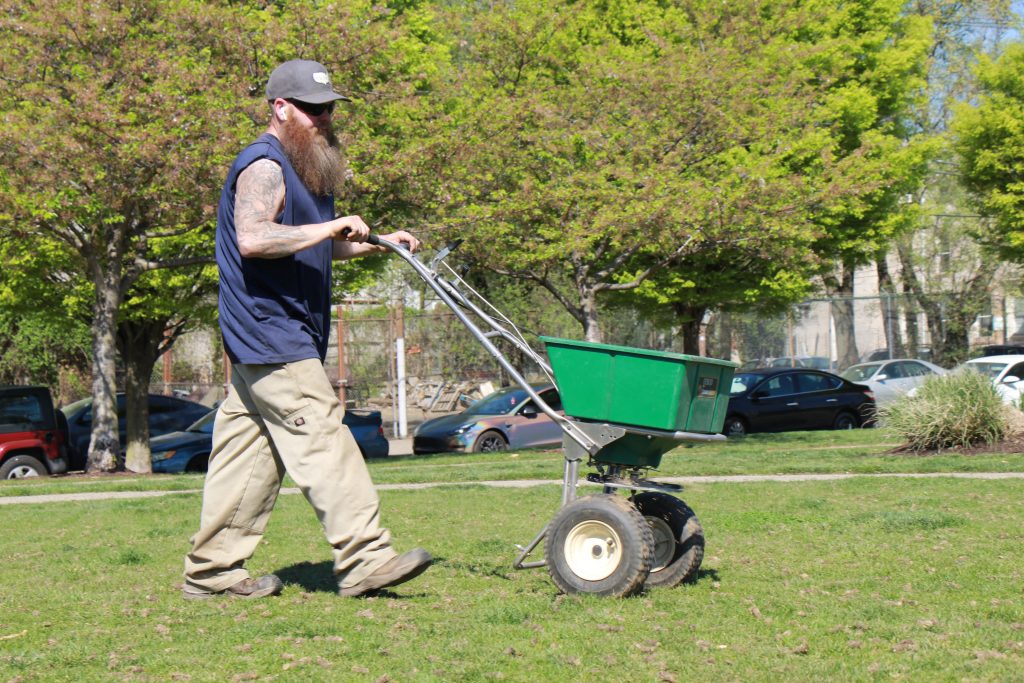
In April 2023, Drexel University began a pilot program for organic land management at Drexel Park. The site will be the first turf space on Drexel’s campus managed without synthetic herbicides, and is part of an effort to transition the entire Drexel campus away from synthetic herbicides and fertilizers that has been the focus of advocacy by students from EcoReps and Re:wild Your Campus groups.
“We’re really excited that this is finally happening,” said Kacy Gao, ‘25, a sophomore at Drexel who advocated for the effort as a leader of the Re:wild Drexel student group. “We’re thrilled that Drexel Director of Grounds Maintenance Scott Dunham is on board. His support for this project has been pivotal.”
Gao, who is a RYC Fellow, and her peers, Sean Vanson, ‘25, and Julie Jeon, ‘25, began advocating for organic land care on Drexel’s campus in the fall of 2021 in partnership with Toxic Free Philly, a Philadelphia-based organization advocating for the elimination of synthetic pesticides in Philadelphia. The group successfully lobbied to pass a law in January 2021 to eliminate the use of synthetic pesticides — including the use of glyphosate — on city grounds and is now calling for enforcement of the law. The students then connected with RYC and joined the 2022-2023 RYC fellowship cohort.
“I salute our students and the University’s Grounds Department for introducing this organic land management program on our campus,” said Drexel President John Fry. “At Drexel, we strive to promote civic engagement and sustainability, which are core values of our mission. As we take the lead toward becoming the first institution in the Commonwealth to join the Re:wild Your Campus movement, we hope others will join us in pursuing a greener and healthier future.”
In implementing the pilot project, Drexel is following in the footsteps of schools like the University of California Berkeley, Harvard University and Seattle University, which have all completely transitioned to organic land management, a holistic form of land care that focuses on cultivating soil health to increase resilience to weed pressures. Research shows that organic land care on campuses can reduce overall costs by 25%, decrease water needs by 37% and improve soil health after an initial investment period of three to five years. Students are hoping this success can be replicated in Drexel’s urban environment. Organic land care also reduces the use of synthetic inputs frequently used on college campuses, instead focusing on naturally outcompeting weed growth by optimizing soil chemistry and microbial density.
“I would like to thank RYC for helping us with securing a grant from the Foundation for Sustainability and Innovation to help fund the first year of the transition project,” said Vanson. “Alongside our organic turf expert consultant PJC Organics, as well as our other partners, Rachel Carson Council and Drexel Climate and Sustainability.”
“After learning about public health and the impact of pesticides in class, I’m really glad that Drexel is taking steps to protect human and environmental health,” said Jeon, who is majoring in nursing. “More schools should follow Drexel’s lead in implementing organic land care to help the climate and biodiversity crisis and protect campus communities, especially in Philadelphia, where environmental justice concerns are pervasive.”
Dunham said his Grounds Maintenance team is excited to be working with students and PJC Organics to pilot the three-year program in Drexel Park. “While we have always been very careful of the types and timing of the products we choose to use on campus, we are hopeful the pilot will show that turf quality can improve, or at the very least remain the same, without the use of synthetic fertilizers and herbicides,” he said.
The student advocates are also working with Anneclaire De Roos, PhD, an associate professor in the Department of Environmental and Occupational Health at the Dornsife School of Public Health, to begin a comparative study on the organic transition. “In public health, we advocate for following the ‘precautionary principle’ – which says when there i’s evidence for health risks but also uncertainty, we should err on the side of public health protection in our decisions,” said De Roos. “So, I think this is a great example of applying the precautionary principle. By switching to organic turf management in Drexel Park, visitors will have less exposure to these possibly harmful herbicides. This could have a big impact because of the number of University students, families with children, and dogs that spend time in the park. Data collection at the site will give insight on the success of the program and hopefully influence similar organic turf management at other Drexel sites and other universities.”
For more information on the EcoReps, please contact Kacy Gao at [email protected] or the Drexel Climate and Sustainability team at [email protected]. To learn more about Re:wild Your Campus, visit www.rewild.org/rewild-your-campus.


